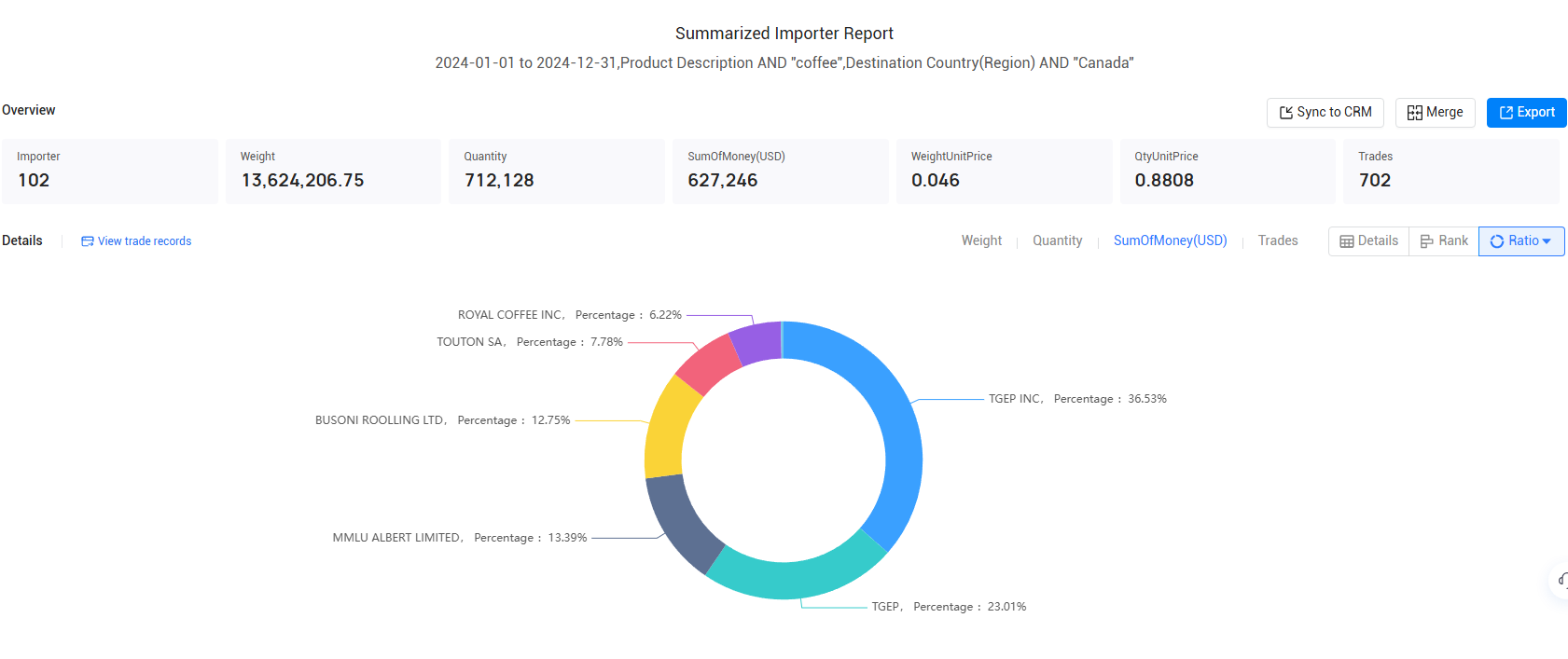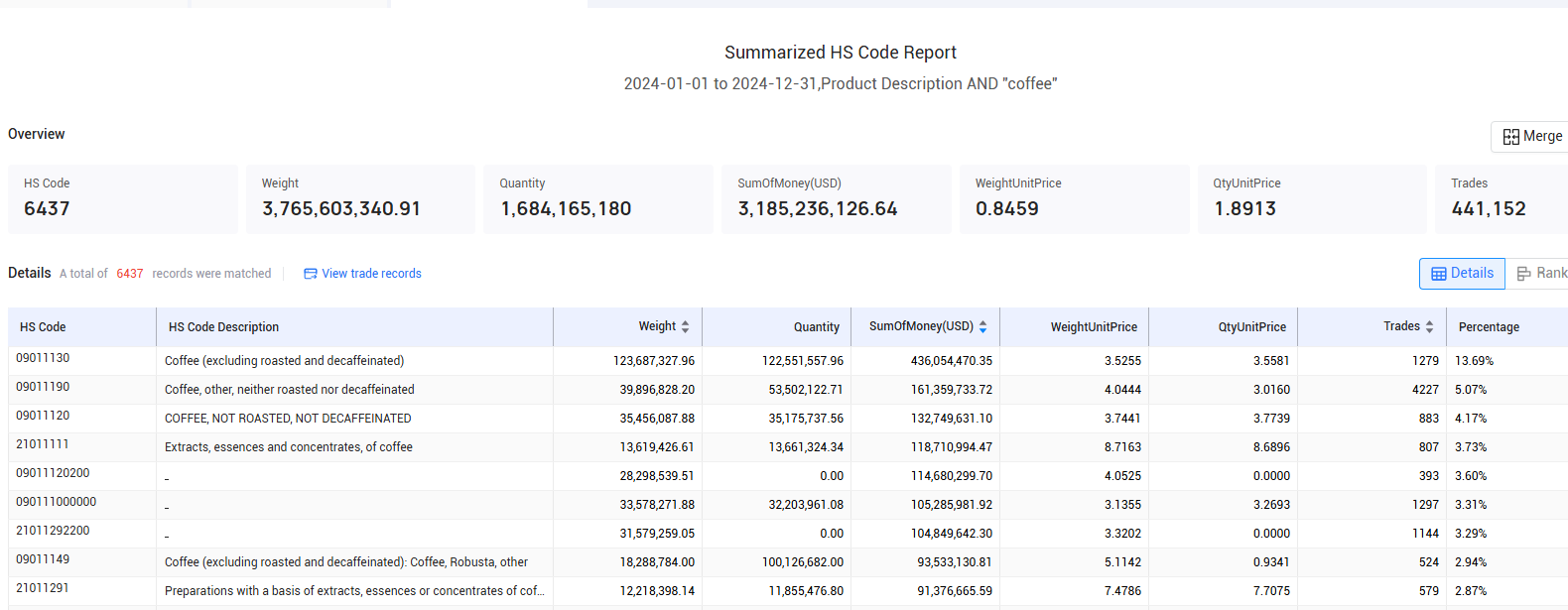 Import News
Import News
 16-12-2024
16-12-2024
In 2023, the global coffee market continued to thrive, with the total value of coffee imports reaching an impressive US$43.8 billion. This marks a 41.3% increase in the value of coffee imports since 2019, highlighting the continued demand for coffee worldwide. While coffee consumption fluctuated year-over-year, the value of coffee imports saw a decline of 10.1% compared to 2022. Among the leading coffee importers, the United States maintained its position as the largest importer, with imports valued at US$8.2 billion, accounting for 18.7% of global coffee purchases. Tendata will introduce top coffee importers worldwide, landscape and trends of coffee trade to you.

The Leading Coffee Importers in 2023
United States: As the top global coffee importer, the U.S. accounted for 18.7% of total coffee imports, importing around US$8.2 billion worth of coffee. The U.S. also stands out for its large importation of Colombian coffee, with more than US$2.2 billion worth of Colombian coffee arriving in 2022.
Germany: With imports totaling US$4.6 billion, Germany secured the second spot among coffee importers, comprising 10.4% of the global total. Despite a 20.3% decrease in its imports compared to 2022, Germany remains a key player in the European coffee market.
France: France saw a modest 3.4% growth in its coffee imports, bringing in US$3.3 billion worth of coffee in 2023, or 7.6% of the global total.
Italy: Known for its strong coffee culture, Italy imported US$2.5 billion worth of coffee in 2023, representing 5.7% of global coffee imports.
Canada: Canada, with imports of US$1.74 billion, rounded out the top five, comprising 4% of the global total. It was one of the few countries that did not experience a decline in coffee imports during the year.
>>Contact Tendata for More Details<<

The Global Coffee Landscape
Globally, coffee consumption continued its upward trajectory, with over 178 million 60kg bags consumed worldwide in 2022/2023. The bulk of the world's coffee comes from South America, particularly Brazil and Colombia, which together account for about 50% of global coffee production. Brazil, the largest coffee producer, produced approximately 69 million 60kg bags of coffee in 2020. This makes coffee one of Brazil's most lucrative industries, feeding the strong export market.
However, the coffee trade is not just about production and consumption. The value of coffee imports rose significantly in the past few years, though global imports in 2023 decreased by 10.1% from 2022, dropping from US$48.7 billion to US$43.8 billion. The top 5 coffee importers—the United States, Germany, France, Italy, and Canada—accounted for nearly half (46.4%) of the global coffee imports, further emphasizing the importance of these countries to the coffee supply chain.
>>Click Here to Access Coffee's HS Code<<

Regional Trends in Coffee Imports
From a regional perspective, Europe dominated coffee imports in 2023, accounting for 55.8% of the global total, with a value of US$24.4 billion. North American coffee importers, led by the United States and Canada, made up 23% of global coffee imports, while Asia followed with 15.7% of the market share. The trend highlights the ongoing importance of European and North American markets in driving the demand for coffee.
Growth Markets and Declines in Coffee Imports
Some regions and countries experienced growth in their coffee imports, with mainland China showing an 11.5% increase, reflecting the growing coffee culture in the country. Similarly, Poland and Spain saw growth of 3.7% and 0.2% respectively. On the other hand, several key coffee importers saw declines in 2023. The United States, Germany, and Belgium all posted decreases in their imported coffee purchases, contributing to the global reduction in coffee import value.
Optimizing Coffee Sourcing for Importers with Tendata
With global coffee trade becoming more competitive, finding reliable suppliers is critical for importers. This is where Tendata, can play a pivotal role for coffee importers and exporters. Tendata provides businesses with a smarter, faster way to identify trustworthy suppliers in coffee-producing countries like Brazil, Colombia, and Ethiopia. The platform uses advanced algorithms to match importers with suppliers based on specific criteria such as product quality, delivery times, and past performance.
For coffee importers looking to stay ahead in the market, Tendata's data-driven insights can help identify emerging suppliers, track market trends, and ensure the best possible sourcing decisions. In an industry where margins can be tight, and supplier reliability is critical, Tendata allows importers to mitigate risks, reduce sourcing time, and make smarter, more informed decisions.
>>Click Here to Get Contact Information of Buyers and Suppliers<<

Conclusion
In 2023, the top coffee importers—United States, Germany, France, Italy, and Canada—together accounted for nearly half of the global coffee imports. The increasing global demand for coffee, combined with shifts in importing patterns, presents both challenges and opportunities for importers. For those navigating the coffee import market, Tendata offers an invaluable tool to streamline the supplier discovery process, minimize risks, and optimize sourcing decisions. Whether you're sourcing from Brazil, Colombia, or elsewhere, Tendata ensures that your coffee imports are both efficient and profitable.
Category
Leave Message for Demo Request or Questions


 T-info
T-info T-discovery
T-discovery

 My
Tendata
My
Tendata Market Analysis
Market Analysis Customer
Development
Customer
Development Competitor
Monitoring
Competitor
Monitoring Customer Relationship
Customer Relationship





































































































































